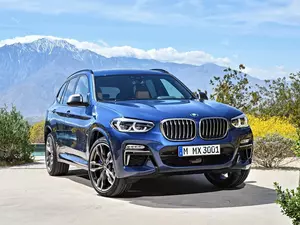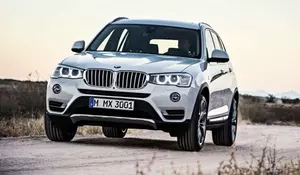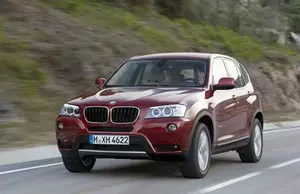
| Vehicle | Precise engine size | Difference from world average | Engine size to consumption ratio | Horsepower from 1 L | Engine size to 100 kg of weight |
|---|---|---|---|---|---|
| 20d |
2 L (1995 cc) |
15% smaller | - | 95 hp from 1 L | 111 cc to 100 kg |
| 30d |
2.99 L (2993 cc) |
27.6% bigger | 73 cc to 1 mpg | 89 hp from 1 L | 166 cc to 100 kg |
| M40i |
3 L (2998 cc) |
27.8% bigger | 130 cc to 1 mpg | 127 hp from 1 L | 150 cc to 100 kg |
| 20i |
2 L (1998 cc) |
14.8% smaller | 61 cc to 1 mpg | 92 hp from 1 L | 111 cc to 100 kg |
| 30i |
2 L (1998 cc) |
14.8% smaller | 61 cc to 1 mpg | 126 hp from 1 L | 111 cc to 100 kg |
| M40d |
2.99 L (2993 cc) |
27.6% bigger | 81 cc to 1 mpg | 109 hp from 1 L | 158 cc to 100 kg |
| 25d |
2 L (1995 cc) |
15% smaller | 46 cc to 1 mpg | 116 hp from 1 L | 111 cc to 100 kg |
| 30e |
2 L (1998 cc) |
14.8% smaller | 18 cc to 1 mpg | 92 hp from 1 L | 100 cc to 100 kg |
| Vehicle | 20d |
|---|---|
| Precise engine size | 2 L (1995 cc) |
| Difference from world average | 15 smaller |
| Engine size to consumption ratio | - |
| Horsepower from 1 L | 95 hp from 1 L |
| Engine size to 100 kg of weight | 111 cc to 100 kg |
| Vehicle | 30d |
| Precise engine size | 2.99 L (2993 cc) |
| Difference from world average | 27.6 bigger |
| Engine size to consumption ratio | 73 cc to 1 mpg |
| Horsepower from 1 L | 89 hp from 1 L |
| Engine size to 100 kg of weight | 166 cc to 100 kg |
| Vehicle | M40i |
| Precise engine size | 3 L (2998 cc) |
| Difference from world average | 27.8 bigger |
| Engine size to consumption ratio | 130 cc to 1 mpg |
| Horsepower from 1 L | 127 hp from 1 L |
| Engine size to 100 kg of weight | 150 cc to 100 kg |
| Vehicle | 20i |
| Precise engine size | 2 L (1998 cc) |
| Difference from world average | 14.8 smaller |
| Engine size to consumption ratio | 61 cc to 1 mpg |
| Horsepower from 1 L | 92 hp from 1 L |
| Engine size to 100 kg of weight | 111 cc to 100 kg |
| Vehicle | 30i |
| Precise engine size | 2 L (1998 cc) |
| Difference from world average | 14.8 smaller |
| Engine size to consumption ratio | 61 cc to 1 mpg |
| Horsepower from 1 L | 126 hp from 1 L |
| Engine size to 100 kg of weight | 111 cc to 100 kg |
| Vehicle | M40d |
| Precise engine size | 2.99 L (2993 cc) |
| Difference from world average | 27.6 bigger |
| Engine size to consumption ratio | 81 cc to 1 mpg |
| Horsepower from 1 L | 109 hp from 1 L |
| Engine size to 100 kg of weight | 158 cc to 100 kg |
| Vehicle | 25d |
| Precise engine size | 2 L (1995 cc) |
| Difference from world average | 15 smaller |
| Engine size to consumption ratio | 46 cc to 1 mpg |
| Horsepower from 1 L | 116 hp from 1 L |
| Engine size to 100 kg of weight | 111 cc to 100 kg |
| Vehicle | 30e |
| Precise engine size | 2 L (1998 cc) |
| Difference from world average | 14.8 smaller |
| Engine size to consumption ratio | 18 cc to 1 mpg |
| Horsepower from 1 L | 92 hp from 1 L |
| Engine size to 100 kg of weight | 100 cc to 100 kg |

| Vehicle | Precise engine size | Difference from world average | Engine size to consumption ratio | Horsepower from 1 L | Engine size to 100 kg of weight |
|---|---|---|---|---|---|
| 18d |
2 L (1995 cc) |
15% smaller | 43 cc to 1 mpg | 75 hp from 1 L | 117 cc to 100 kg |
| 20d |
2 L (1995 cc) |
15% smaller | 44 cc to 1 mpg | 95 hp from 1 L | 117 cc to 100 kg |
| 20i |
2 L (1997 cc) |
14.9% smaller | 59 cc to 1 mpg | 92 hp from 1 L | 117 cc to 100 kg |
| 30d |
2.99 L (2993 cc) |
27.6% bigger | 75 cc to 1 mpg | 86 hp from 1 L | 166 cc to 100 kg |
| 28i |
2 L (1997 cc) |
14.9% smaller | 62 cc to 1 mpg | 123 hp from 1 L | 111 cc to 100 kg |
| 35d |
2.99 L (2993 cc) |
27.6% bigger | 77 cc to 1 mpg | 105 hp from 1 L | 158 cc to 100 kg |
| 35i |
2.98 L (2979 cc) |
27% bigger | 106 cc to 1 mpg | 103 hp from 1 L | 166 cc to 100 kg |
| Vehicle | 18d |
|---|---|
| Precise engine size | 2 L (1995 cc) |
| Difference from world average | 15 smaller |
| Engine size to consumption ratio | 43 cc to 1 mpg |
| Horsepower from 1 L | 75 hp from 1 L |
| Engine size to 100 kg of weight | 117 cc to 100 kg |
| Vehicle | 20d |
| Precise engine size | 2 L (1995 cc) |
| Difference from world average | 15 smaller |
| Engine size to consumption ratio | 44 cc to 1 mpg |
| Horsepower from 1 L | 95 hp from 1 L |
| Engine size to 100 kg of weight | 117 cc to 100 kg |
| Vehicle | 20i |
| Precise engine size | 2 L (1997 cc) |
| Difference from world average | 14.9 smaller |
| Engine size to consumption ratio | 59 cc to 1 mpg |
| Horsepower from 1 L | 92 hp from 1 L |
| Engine size to 100 kg of weight | 117 cc to 100 kg |
| Vehicle | 30d |
| Precise engine size | 2.99 L (2993 cc) |
| Difference from world average | 27.6 bigger |
| Engine size to consumption ratio | 75 cc to 1 mpg |
| Horsepower from 1 L | 86 hp from 1 L |
| Engine size to 100 kg of weight | 166 cc to 100 kg |
| Vehicle | 28i |
| Precise engine size | 2 L (1997 cc) |
| Difference from world average | 14.9 smaller |
| Engine size to consumption ratio | 62 cc to 1 mpg |
| Horsepower from 1 L | 123 hp from 1 L |
| Engine size to 100 kg of weight | 111 cc to 100 kg |
| Vehicle | 35d |
| Precise engine size | 2.99 L (2993 cc) |
| Difference from world average | 27.6 bigger |
| Engine size to consumption ratio | 77 cc to 1 mpg |
| Horsepower from 1 L | 105 hp from 1 L |
| Engine size to 100 kg of weight | 158 cc to 100 kg |
| Vehicle | 35i |
| Precise engine size | 2.98 L (2979 cc) |
| Difference from world average | 27 bigger |
| Engine size to consumption ratio | 106 cc to 1 mpg |
| Horsepower from 1 L | 103 hp from 1 L |
| Engine size to 100 kg of weight | 166 cc to 100 kg |

| Vehicle | Precise engine size | Difference from world average | Engine size to consumption ratio | Horsepower from 1 L | Engine size to 100 kg of weight |
|---|---|---|---|---|---|
| 20d |
2 L (1995 cc) |
15% smaller | 48 cc to 1 mpg | 92 hp from 1 L | 117 cc to 100 kg |
| 28i |
2 L (1997 cc) |
14.9% smaller | 64 cc to 1 mpg | 123 hp from 1 L | 117 cc to 100 kg |
| 18d |
2 L (1995 cc) |
15% smaller | 43 cc to 1 mpg | 72 hp from 1 L | 117 cc to 100 kg |
| 20i |
2 L (1997 cc) |
14.9% smaller | 67 cc to 1 mpg | 92 hp from 1 L | 117 cc to 100 kg |
| 30d |
2.99 L (2993 cc) |
27.6% bigger | 77 cc to 1 mpg | 86 hp from 1 L | 166 cc to 100 kg |
| 35i |
2.98 L (2979 cc) |
27% bigger | 110 cc to 1 mpg | 103 hp from 1 L | 166 cc to 100 kg |
| 35d |
2.99 L (2993 cc) |
27.6% bigger | 77 cc to 1 mpg | 105 hp from 1 L | 158 cc to 100 kg |
| Vehicle | 20d |
|---|---|
| Precise engine size | 2 L (1995 cc) |
| Difference from world average | 15 smaller |
| Engine size to consumption ratio | 48 cc to 1 mpg |
| Horsepower from 1 L | 92 hp from 1 L |
| Engine size to 100 kg of weight | 117 cc to 100 kg |
| Vehicle | 28i |
| Precise engine size | 2 L (1997 cc) |
| Difference from world average | 14.9 smaller |
| Engine size to consumption ratio | 64 cc to 1 mpg |
| Horsepower from 1 L | 123 hp from 1 L |
| Engine size to 100 kg of weight | 117 cc to 100 kg |
| Vehicle | 18d |
| Precise engine size | 2 L (1995 cc) |
| Difference from world average | 15 smaller |
| Engine size to consumption ratio | 43 cc to 1 mpg |
| Horsepower from 1 L | 72 hp from 1 L |
| Engine size to 100 kg of weight | 117 cc to 100 kg |
| Vehicle | 20i |
| Precise engine size | 2 L (1997 cc) |
| Difference from world average | 14.9 smaller |
| Engine size to consumption ratio | 67 cc to 1 mpg |
| Horsepower from 1 L | 92 hp from 1 L |
| Engine size to 100 kg of weight | 117 cc to 100 kg |
| Vehicle | 30d |
| Precise engine size | 2.99 L (2993 cc) |
| Difference from world average | 27.6 bigger |
| Engine size to consumption ratio | 77 cc to 1 mpg |
| Horsepower from 1 L | 86 hp from 1 L |
| Engine size to 100 kg of weight | 166 cc to 100 kg |
| Vehicle | 35i |
| Precise engine size | 2.98 L (2979 cc) |
| Difference from world average | 27 bigger |
| Engine size to consumption ratio | 110 cc to 1 mpg |
| Horsepower from 1 L | 103 hp from 1 L |
| Engine size to 100 kg of weight | 166 cc to 100 kg |
| Vehicle | 35d |
| Precise engine size | 2.99 L (2993 cc) |
| Difference from world average | 27.6 bigger |
| Engine size to consumption ratio | 77 cc to 1 mpg |
| Horsepower from 1 L | 105 hp from 1 L |
| Engine size to 100 kg of weight | 158 cc to 100 kg |

| Vehicle | Precise engine size | Difference from world average | Engine size to consumption ratio | Horsepower from 1 L | Engine size to 100 kg of weight |
|---|---|---|---|---|---|
| 3.0d |
2.99 L (2993 cc) |
27.6% bigger | 100 cc to 1 mpg | 73 hp from 1 L | 166 cc to 100 kg |
| 3.0si |
3 L (2996 cc) |
27.7% bigger | 130 cc to 1 mpg | 91 hp from 1 L | 176 cc to 100 kg |
| 2.5si |
2.5 L (2497 cc) |
6.4% bigger | 109 cc to 1 mpg | 87 hp from 1 L | 139 cc to 100 kg |
| 2.0d |
2 L (1995 cc) |
15% smaller | 55 cc to 1 mpg | 89 hp from 1 L | 117 cc to 100 kg |
| 18d |
2 L (1995 cc) |
15% smaller | 53 cc to 1 mpg | 72 hp from 1 L | 117 cc to 100 kg |
| 30d |
2.99 L (2993 cc) |
27.6% bigger | 97 cc to 1 mpg | 73 hp from 1 L | 166 cc to 100 kg |
| 35d |
2.99 L (2993 cc) |
27.6% bigger | 100 cc to 1 mpg | 96 hp from 1 L | 158 cc to 100 kg |
| 20i |
2 L (1995 cc) |
15% smaller | 77 cc to 1 mpg | 75 hp from 1 L | 117 cc to 100 kg |
| 25i |
2.5 L (2497 cc) |
6.4% bigger | 100 cc to 1 mpg | 87 hp from 1 L | 147 cc to 100 kg |
| 30i |
3 L (2996 cc) |
27.7% bigger | 120 cc to 1 mpg | 91 hp from 1 L | 176 cc to 100 kg |
| 2.0i |
2 L (1995 cc) |
15% smaller | 80 cc to 1 mpg | 75 hp from 1 L | 117 cc to 100 kg |
| 3.0sd |
2.99 L (2993 cc) |
27.6% bigger | 111 cc to 1 mpg | 96 hp from 1 L | 158 cc to 100 kg |
| Vehicle | 3.0d |
|---|---|
| Precise engine size | 2.99 L (2993 cc) |
| Difference from world average | 27.6 bigger |
| Engine size to consumption ratio | 100 cc to 1 mpg |
| Horsepower from 1 L | 73 hp from 1 L |
| Engine size to 100 kg of weight | 166 cc to 100 kg |
| Vehicle | 3.0si |
| Precise engine size | 3 L (2996 cc) |
| Difference from world average | 27.7 bigger |
| Engine size to consumption ratio | 130 cc to 1 mpg |
| Horsepower from 1 L | 91 hp from 1 L |
| Engine size to 100 kg of weight | 176 cc to 100 kg |
| Vehicle | 2.5si |
| Precise engine size | 2.5 L (2497 cc) |
| Difference from world average | 6.4 bigger |
| Engine size to consumption ratio | 109 cc to 1 mpg |
| Horsepower from 1 L | 87 hp from 1 L |
| Engine size to 100 kg of weight | 139 cc to 100 kg |
| Vehicle | 2.0d |
| Precise engine size | 2 L (1995 cc) |
| Difference from world average | 15 smaller |
| Engine size to consumption ratio | 55 cc to 1 mpg |
| Horsepower from 1 L | 89 hp from 1 L |
| Engine size to 100 kg of weight | 117 cc to 100 kg |
| Vehicle | 18d |
| Precise engine size | 2 L (1995 cc) |
| Difference from world average | 15 smaller |
| Engine size to consumption ratio | 53 cc to 1 mpg |
| Horsepower from 1 L | 72 hp from 1 L |
| Engine size to 100 kg of weight | 117 cc to 100 kg |
| Vehicle | 30d |
| Precise engine size | 2.99 L (2993 cc) |
| Difference from world average | 27.6 bigger |
| Engine size to consumption ratio | 97 cc to 1 mpg |
| Horsepower from 1 L | 73 hp from 1 L |
| Engine size to 100 kg of weight | 166 cc to 100 kg |
| Vehicle | 35d |
| Precise engine size | 2.99 L (2993 cc) |
| Difference from world average | 27.6 bigger |
| Engine size to consumption ratio | 100 cc to 1 mpg |
| Horsepower from 1 L | 96 hp from 1 L |
| Engine size to 100 kg of weight | 158 cc to 100 kg |
| Vehicle | 20i |
| Precise engine size | 2 L (1995 cc) |
| Difference from world average | 15 smaller |
| Engine size to consumption ratio | 77 cc to 1 mpg |
| Horsepower from 1 L | 75 hp from 1 L |
| Engine size to 100 kg of weight | 117 cc to 100 kg |
| Vehicle | 25i |
| Precise engine size | 2.5 L (2497 cc) |
| Difference from world average | 6.4 bigger |
| Engine size to consumption ratio | 100 cc to 1 mpg |
| Horsepower from 1 L | 87 hp from 1 L |
| Engine size to 100 kg of weight | 147 cc to 100 kg |
| Vehicle | 30i |
| Precise engine size | 3 L (2996 cc) |
| Difference from world average | 27.7 bigger |
| Engine size to consumption ratio | 120 cc to 1 mpg |
| Horsepower from 1 L | 91 hp from 1 L |
| Engine size to 100 kg of weight | 176 cc to 100 kg |
| Vehicle | 2.0i |
| Precise engine size | 2 L (1995 cc) |
| Difference from world average | 15 smaller |
| Engine size to consumption ratio | 80 cc to 1 mpg |
| Horsepower from 1 L | 75 hp from 1 L |
| Engine size to 100 kg of weight | 117 cc to 100 kg |
| Vehicle | 3.0sd |
| Precise engine size | 2.99 L (2993 cc) |
| Difference from world average | 27.6 bigger |
| Engine size to consumption ratio | 111 cc to 1 mpg |
| Horsepower from 1 L | 96 hp from 1 L |
| Engine size to 100 kg of weight | 158 cc to 100 kg |

| Vehicle | Precise engine size | Difference from world average | Engine size to consumption ratio | Horsepower from 1 L | Engine size to 100 kg of weight |
|---|---|---|---|---|---|
| 3.0d |
2.99 L (2993 cc) |
27.6% bigger | 107 cc to 1 mpg | 68 hp from 1 L | 166 cc to 100 kg |
| 2.5i |
2.49 L (2494 cc) |
6.3% bigger | 119 cc to 1 mpg | 77 hp from 1 L | 139 cc to 100 kg |
| 3.0i |
2.98 L (2979 cc) |
27% bigger | 142 cc to 1 mpg | 78 hp from 1 L | 166 cc to 100 kg |
| 2.0i |
2 L (1995 cc) |
15% smaller | 80 cc to 1 mpg | 75 hp from 1 L | 117 cc to 100 kg |
| 2.0d |
2 L (1995 cc) |
15% smaller | 60 cc to 1 mpg | 75 hp from 1 L | 111 cc to 100 kg |
| Vehicle | 3.0d |
|---|---|
| Precise engine size | 2.99 L (2993 cc) |
| Difference from world average | 27.6 bigger |
| Engine size to consumption ratio | 107 cc to 1 mpg |
| Horsepower from 1 L | 68 hp from 1 L |
| Engine size to 100 kg of weight | 166 cc to 100 kg |
| Vehicle | 2.5i |
| Precise engine size | 2.49 L (2494 cc) |
| Difference from world average | 6.3 bigger |
| Engine size to consumption ratio | 119 cc to 1 mpg |
| Horsepower from 1 L | 77 hp from 1 L |
| Engine size to 100 kg of weight | 139 cc to 100 kg |
| Vehicle | 3.0i |
| Precise engine size | 2.98 L (2979 cc) |
| Difference from world average | 27 bigger |
| Engine size to consumption ratio | 142 cc to 1 mpg |
| Horsepower from 1 L | 78 hp from 1 L |
| Engine size to 100 kg of weight | 166 cc to 100 kg |
| Vehicle | 2.0i |
| Precise engine size | 2 L (1995 cc) |
| Difference from world average | 15 smaller |
| Engine size to consumption ratio | 80 cc to 1 mpg |
| Horsepower from 1 L | 75 hp from 1 L |
| Engine size to 100 kg of weight | 117 cc to 100 kg |
| Vehicle | 2.0d |
| Precise engine size | 2 L (1995 cc) |
| Difference from world average | 15 smaller |
| Engine size to consumption ratio | 60 cc to 1 mpg |
| Horsepower from 1 L | 75 hp from 1 L |
| Engine size to 100 kg of weight | 111 cc to 100 kg |